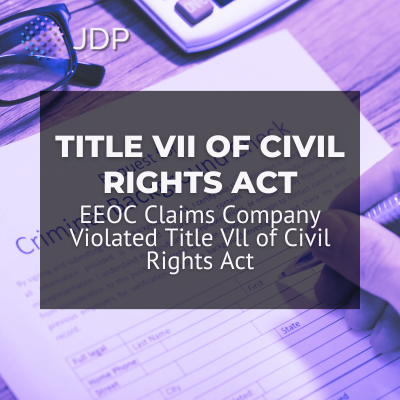July 31, 2024
The Equal Employment Opportunity Commission (EEOC) recently filed a lawsuit against a regional convenience store chain with 600 stores and employs around 23,000 individuals in six states. This lawsuit addressed the company’s hiring process, which rejected many applicants in a way that concerned the EEOC. The concern stemmed from a 2022 Rand Corporation study that revealed that over half of unemployed men in their 30s struggled to find work due to having a criminal history.
According to the suit, the process questioned applicants about their criminal history on the application. After reviewing the results, the company followed this with a criminal background check and chose not to hire anyone who “failed” the check. This practice has led to many rejections for applicants. Allegedly, the company did not consider whether the criminal records pertained to the position in the application.
During the suit, the EEOC struggled to reach an agreement with the convenience store chain. As such, it filed a lawsuit against the company over its screening practices. The primary argument addresses how the company rejects screened applicants based on their conviction records.
However, the EEOC clarified that it did not excuse the chain for deliberately discriminating against minority job applicants. The Commission openly acknowledged that the company’s hiring practices appeared race-neutral. Instead, it claimed that the hiring process caused the disproportionate removal of applicants with specific backgrounds.
The EEOC cited examples of Native Americans, Alaska Natives, multiracial individuals, and black applicants who saw a significant portion of the company’s overall rejections. Thus, the Commission argued that the chain violated Title VII of the Civil Rights Act of 1964 due to the criminal history checking process. The lawsuit requests that the court order the company to end this hiring practice.
Before this lawsuit, the EEOC stressed a strict intention to enforce regulations concerning hiring decisions based on criminal history. Interested parties can find details about its intentions in “Arrest and Conviction Records: Resources for Job Seekers, Workers, and Employers” and “Enforcement Guidance on the Consideration of Arrest and Conviction Records in Employment Decisions under Title VII of the Civil Rights Act.“
This lawsuit is the most recent proof of the EEOC’s intentions to correct companies’ hiring practices to ensure equal employment opportunities. This suit is also a reminder that the EEOC or an impacted individual could challenge hiring decisions where employers inquired about criminal backgrounds and used that information to make a hiring decision.
Disclaimer:
Information provided here is for educational and informational purposes only and should not constitute as legal advice. We recommend you contact your own legal counsel for any questions regarding your specific practices and compliance with applicable laws.
